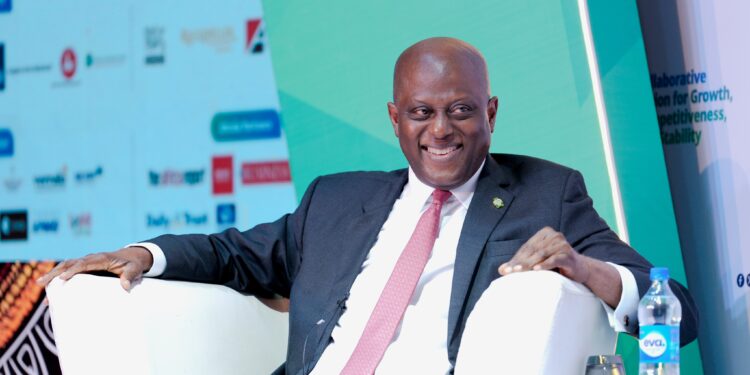NCGC: 80% of Nigerian MSMEs Still Struggle to Access Formal Loans

A staggering 80 percent of Nigeria’s micro, small, and medium enterprises (MSMEs) continue to operate without access to formal credit facilities. This troubling statistic was brought to light by the National Credit Guarantee Company (NCGC) at its first-ever Stakeholders’ Engagement Forum held in Lagos.
The Managing Director of NCGC, Mr. Bonaventure Okhaimo, didn’t mince words as he addressed the deep-rooted financial barriers limiting the growth of small businesses in Nigeria. He called for urgent collaboration among commercial banks, microfinance institutions, fintech companies, and development finance bodies to create a more inclusive credit ecosystem for MSMEs.
According to Okhaimo, one of the biggest challenges facing small business owners is the issue of collateral. Most financial institutions are still reluctant to lend to MSMEs due to what he described as an entrenched fear of risk. “We estimate that around 80 percent of MSMEs are locked out of the formal credit system. This is mostly due to the tough collateral demands and an industry-wide aversion to lending without guarantees,” he said.
The forum, themed Unlocking Access to Finance Through Credit Guarantees and Strategic Partnership, brought together key players from various segments of Nigeria’s financial sector. The turnout and the topics discussed reflected growing concern about how access to finance is limiting the ability of small businesses to scale and survive in today’s harsh economic climate.
Mr. Okhaimo explained that the creation of the NCGC is a strategic response by the federal government to address this long-standing issue. He described the initiative as a bold and proactive measure by the current administration under President Bola Tinubu, aimed at reducing lending risks and creating opportunities for small-scale entrepreneurs to thrive.
NCGC was established through a joint effort by the Ministry of Finance Incorporated, the Bank of Industry, Credicorp Limited, and the Nigeria Sovereign Investment Authority. It has also received technical support from both the Central Bank of Nigeria and the World Bank.
While Nigeria’s economy recorded some positive indicators in the first quarter of 2025, such as a modest GDP growth rate of 3.13 percent, the reality on the ground tells a different story. Soaring inflation, rising energy costs, and unstable exchange rates continue to choke business operations, especially for small and medium-sized enterprises.
“More than 40 percent of manufacturers cannot access the credit they need to operate at full strength,” Okhaimo said. He referenced figures from 2023, which showed that over 760 manufacturing businesses had to shut down, leading to the loss of at least 18,000 jobs. These statistics paint a grim picture of the manufacturing sector and underline the urgent need for credit reform.
In the same vein, manufacturing exports took a sharp nosedive, dropping from a value of N1.04 trillion in the third quarter of 2024 to just N294 billion in the first quarter of 2025. The sharp fall, attributed to limited credit access and unaffordable interest rates, is a stark warning about the country’s industrial future.
Despite these economic challenges, the NCGC has outlined a plan to stimulate lending to viable small businesses by taking on part of the risk that lenders currently fear. With a start-up capital base of N100 billion, the agency will not directly disburse loans but will instead offer partial guarantees to banks and other lenders. This move, they believe, will encourage financial institutions to lend more confidently.
“We are not lenders,” Okhaimo clarified. “Our role is to provide a safety net. We’ll cover part of the losses if a borrower defaults, which will make banks more willing to support small business owners.”
He also shared NCGC’s strategy to partner closely with participating financial institutions. This approach will include the use of data analytics to better assess borrower risks and introduce policies that promote broader financial inclusion.
“It’s time for a system where farmers, tailors, welders, and entrepreneurs of all kinds are given a fair shot at success. They deserve opportunity, not obstacles,” he added.
Economist and founder of B. Adedipe Associates, Dr. Biodun Adedipe, gave a keynote presentation during the forum and criticized Nigeria’s historic failure to build a robust credit system. Between 2015 and 2020, he noted, the country’s credit-to-GDP ratio for the private sector was consistently between 10 to 15 percent—far below what is seen in more mature economies.
By comparison, South Africa stood at 109 percent, Morocco at 66 percent, and Kenya at over 32 percent. The global average hovers around 146 percent, placing Nigeria far behind. Dr. Adedipe welcomed the establishment of NCGC, describing it as a long-overdue intervention that could change the trajectory of Nigeria’s financial future.
Another key voice at the event, Professor Chris Onalo, who serves as the Registrar and Chief Executive Officer of the National Institute of Credit Administration, emphasized the need for transparency and credibility in NCGC’s operations. He stressed that trust would be the bedrock of the agency’s success.
“Stakeholders will only come on board if they believe in the process,” Onalo said. “NCGC must lead with integrity and align its goals with Nigeria’s broader financial inclusion agenda.”
Overall, the Stakeholders’ Engagement Forum marks a significant shift from conversations to actual policy execution. With a clear mission and strong institutional backing, NCGC is positioned to tackle one of the most pressing issues facing Nigeria’s economy.
The real test, however, will be in how effectively this institution can deliver on its promise. For millions of small business owners across the country who continue to rely on personal savings, loans from friends, or informal lenders, the hope is that this new guarantee system will finally open the door to formal credit—and with it, the opportunity to grow and thrive.
As Nigeria navigates complex economic waters, many believe that empowering MSMEs through easier access to credit may be one of the surest ways to drive sustainable development and job creation.




Responses